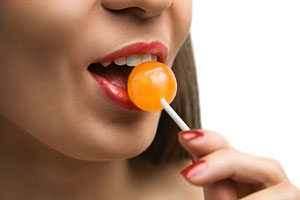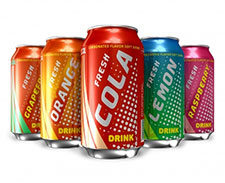Yellow Teeth After Braces: Why It Happens & How to Fix It
December 17th, 2015
 The last thing you want is yellow teeth after years of wearing braces. But unfortunately, it’s a very common occurrence. If you don’t take care of your mouth while you’re wearing braces, you might be surprised to see white squares where your braces were on yellow-stained teeth after your dentist removes them. Thankfully, it’s easy to avoid this experience. Here are some reasons why people get yellow teeth after braces and how to prevent this from happening. We’ll also talk about how you can fix stained teeth after braces.
The last thing you want is yellow teeth after years of wearing braces. But unfortunately, it’s a very common occurrence. If you don’t take care of your mouth while you’re wearing braces, you might be surprised to see white squares where your braces were on yellow-stained teeth after your dentist removes them. Thankfully, it’s easy to avoid this experience. Here are some reasons why people get yellow teeth after braces and how to prevent this from happening. We’ll also talk about how you can fix stained teeth after braces.
Brush Properly With A Toothbrush Made for Braces
With all the brackets and wires crowding your teeth, it’s easy for plaque to build up in hard-to-reach places. That’s why it’s especially important for you to brush properly when you have braces. When plaque is left to sit on your teeth, your teeth start to decay, causing them to turn yellow.
People with braces should ask their dentist about electric toothbrushes that are specifically designed for mouths with braces. These brushes will have bristles that are made to remove plaque around brackets and get through wires.
Floss Every Day, Getting Those Hard-to-Reach Spots
Having braces can feel like a great excuse to not floss, since it’s harder to reach the spaces between your teeth. But with more bacteria buildup, it’s extremely important to floss with braces. Just like with brushing, flossing every day will help keep your teeth from decaying and turning yellow.
Superfloss is the best type of floss for people with braces. It’s made up of three types of floss: soft spongy floss, a stiffened-end threader, and regular floss. The stiffened-end threader makes it easier to get between your braces, and the large spongy floss helps you clean around your brackets and wires.
Avoid Tooth-Staining Food
Some food and drinks contain colored properties that can stick to your teeth’s enamel and change their beautiful white color to yellow. These include soda and “sports drinks”, hard and gummy candy, red wine, and coffee. It’s best to avoid these teeth-staining foods and drinks as often as possible, or slowly consume them with glass of water. When you do eat or drink them, wash out your mouth and brush afterwards to keep them from staining your teeth.
Don’t Smoke
Smoking is a big culprit of yellowing teeth, along with other horrible diseases and issues. There’s really no good reason to continue smoking. One of the many effects of smoking is yellowing teeth, caused by the nicotine and tar in tobacco. This can occur not just from smoking, but also from chewing tobacco. Tobacco use is one thing you should quit for good - not just when you have braces.
Use Invisalign Instead of Traditional Braces
If you haven’t had braces yet, you should consider using Invisalign instead of traditional braces. Since Invisalign braces are removable, it’s much easier to keep your braces and teeth clean, reducing the chance that your teeth will turn yellow. Brushing and flossing will be exactly the same as when you didn’t have braces!
Receive Teeth Whitening Treatment After Braces
If your teeth begin yellowing while you have braces, you don’t have to say goodbye to your pearly whites for good. Ask your dentist about teeth whitening after braces! At Water Tower Dental Care, we use Zoom! Teeth Whitening to change the color of your teeth dramatically after just one visit. This leading teeth whitening system brightens up your smile up to 8 shades in about an hour. It’s as easy as that.
Don’t settle for a yellow smile. Contact us to learn more about whitening your teeth after braces! There’s no better place to bring back your beautiful smile than at Chicago’s top cosmetic dentistry.

 Sensitive teeth can be caused by a number of issues including an exposed nerve, a fractured or worn tooth, and receding gums. While visiting a dentist is the best way to prevent most of these issues, you can avoid the pain that is associated with sensitive teeth by limiting certain foods and drinks. Here are the most common types of food that can agitate your teeth and cause a lot of pain.
Sensitive teeth can be caused by a number of issues including an exposed nerve, a fractured or worn tooth, and receding gums. While visiting a dentist is the best way to prevent most of these issues, you can avoid the pain that is associated with sensitive teeth by limiting certain foods and drinks. Here are the most common types of food that can agitate your teeth and cause a lot of pain. We all love the holidays, but it’s important to be aware of your oral health during these festive times. Taking care of your teeth and gums during the holidays is simple. All it includes is avoiding a few nasty habits and being aware of the treats that can be most harmful to your teeth. Here are our four dental health tips for the holiday season.
We all love the holidays, but it’s important to be aware of your oral health during these festive times. Taking care of your teeth and gums during the holidays is simple. All it includes is avoiding a few nasty habits and being aware of the treats that can be most harmful to your teeth. Here are our four dental health tips for the holiday season. We’ve all been taught since a very young age that candy is the ultimate destroyer against teeth. However, new candies developed by scientists are turning that old story around. Now, there are several new candies (along with some older) that have beneficial attributes.
We’ve all been taught since a very young age that candy is the ultimate destroyer against teeth. However, new candies developed by scientists are turning that old story around. Now, there are several new candies (along with some older) that have beneficial attributes. We spend a considerable amount of time discussing the
We spend a considerable amount of time discussing the 




 Website Powered by Sesame 24-7™
Website Powered by Sesame 24-7™